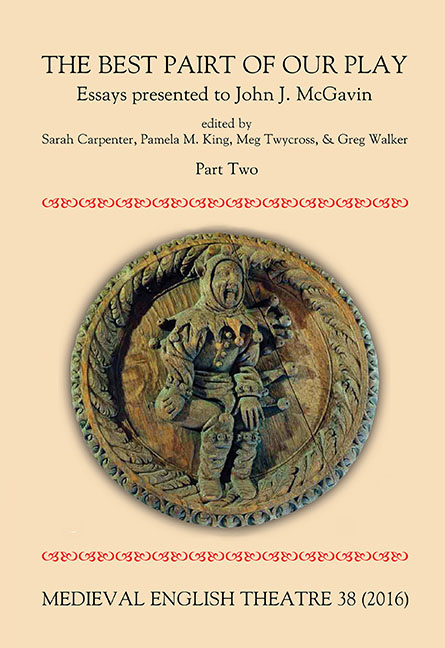 Medieval English Theatre 38
Medieval English Theatre 38 Published online by Cambridge University Press: 20 April 2017
What George Myerson has called ‘the argumentative imagination’ took a variety of memorable forms in late-medieval England. Myerson was particularly concerned with post-medieval examples of religious dialogue, but many intellectually ambitious texts from late-medieval Europe as a whole, whether in Latin or the vernacular, in their original language or in translation, used dialogue as a means of structuring, articulating, and stresstesting complex materials. Combining the internally-focused rigour of logic with the externally-focused pragmatism of rhetoric, dialogue functioned as an emissary between the intellect and the imagination across a wide range of literary and dramatic contexts. Anne Godard has discussed how, in some late-medieval religious writings, dialogue functions as a way of mediating between the atemporal sphere of revelation and the inevitably temporal context in which such privileged and esoteric experiences become subject to discursive transmission. In Caterina of Siena's mystical dialogues and in the philosophical dialogues of Cusanus or Ficino, she argues, dialogue constructs a relationship between the immediacy of the vision received and the mediated nature of the intelligible discourse into which it is translated. The discursive texture of Julian of Norwich's Short and Long Texts would corroborate Godard's nuanced situating of dialogue as intrinsic to the process whereby mystical experience is turned into discursive literature. Likewise, as its alternative title, Liber Quaestionum, implies, Liber V of Bridget of Sweden's Revelationes (Liber Caelestis) mobilises discursive resources reminiscent of those used in scholastic debate. The Mirror of Simple Souls, with its multiple interlocutors, could also be added to this list. And although a very different kind of vision, Piers Plowman is a foundational text in the medieval history of the argumentative imagination, the colophon of the B-text in Trinity College, Cambridge, MS B. 15. 17 — Explicit hic dialogus Petri Plowman — pointedly prioritising the poem's formidably aporetic qualities over any of its other generic features.
Visionary literature is, of course, only one kind of genre in which a body of knowledge or experience is subjected to the dramatic, reflective, and critical properties of dialogue. Myerson's elaboration of the concept of the argumentative imagination presents it as the engine of ‘whole, poetic worlds which would not exist except through the representation of argument’. Argument, in this context, is conceived as ‘a living relationship, a relationship between differing voices’.
To save this book to your Kindle, first ensure [email protected] is added to your Approved Personal Document E-mail List under your Personal Document Settings on the Manage Your Content and Devices page of your Amazon account. Then enter the ‘name’ part of your Kindle email address below. Find out more about saving to your Kindle.
Note you can select to save to either the @free.kindle.com or @kindle.com variations. ‘@free.kindle.com’ emails are free but can only be saved to your device when it is connected to wi-fi. ‘@kindle.com’ emails can be delivered even when you are not connected to wi-fi, but note that service fees apply.
Find out more about the Kindle Personal Document Service.
To save content items to your account, please confirm that you agree to abide by our usage policies. If this is the first time you use this feature, you will be asked to authorise Cambridge Core to connect with your account. Find out more about saving content to Dropbox.
To save content items to your account, please confirm that you agree to abide by our usage policies. If this is the first time you use this feature, you will be asked to authorise Cambridge Core to connect with your account. Find out more about saving content to Google Drive.